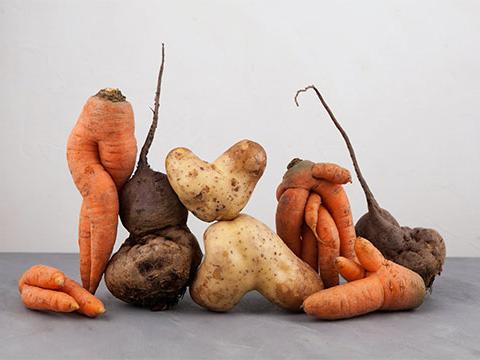
Posted to News on 19th Aug 2022, 08:58
Packers and processors need to adapt to wonky veg

Following this morning’s BBC news report that fruit and veg will be smaller and look different as the summer’s hot and dry weather hits crops, Scorpion Vision is advising processors and packers of fresh produce to consider upgrading to AI-powered vision technology.
Processing systems guided by classic machine vision do not have the intelligence to handle non-uniform produce – the only way of maintaining line efficiencies in the face of variability is by implementing processing and inspection systems that combine AI with 3D vision.
Many areas of the UK have seen very low rainfall in 2022, and parts of England are in drought. Today, the BBC reported that potatoes, onions, carrots, apples and Brussels sprouts are likely to be worst affected by the hot, dry weather.
The National Farmers’ Union (NFU) has also appealed for shoppers to accept smaller vegetables and potatoes, as it said the driest July on record could mean many items will struggle to meet with supermarket quality standards – and may look ‘different’ to what consumers are used to .
“The NFU is urging retailers to accept more out-of-spec produce and consumers to get used to wonky veg on shelf. We are urging processors and packers to future-proof their lines to cope with greater variability by embracing AI-powered vision tech – an option that has only become commercially viable and available in the last few years,” says Paul Wilson, managing director at Scorpion Vision.
He continues: “Many agri food businesses still employ mechanical processing systems and might be daunted by talk of artificial intelligence and 3D vision. We want to reassure them that although these are complex ‘black box’ technologies, our job is to integrate them into easy-to-use solutions. Automating mechanical processes with systems guided by AI-optimised 3D imaging translates directly to bottom line benefits through higher yields and reduced reliance on manual labour. It also allows businesses to guarantee unprecedented product presentation and deliver on sustainability metrics as waste resulting from processing errors is slashed to virtually zero.”
Processing wonky produce
Traditional systems for sorting, grading, inspecting, trimming, de-coring and peeling fruit and veg use classic 3D vision to look for features in the product image. This can only look for features that conform to a pattern or shape that is expected – the tip of a carrot or the stem plate on a leek, for example. However, wonky vegetables don’t come in a fixed size, shape or colour, and this inherent variability translates to compromised processing performance.
Taking leeks as an example, with an automation platform that relies on classic machine vision, just 60% of processed leeks will be cut at exactly the correct point. The rest will either be cut roughly, at a poor angle or slightly too short or long. Some may be written off altogether or not cut at all. This level of waste is unacceptable from a commercial and an environmental standpoint. The ‘wonkier’ the leeks, the higher the percentage of products that won’t make the grade.
The arrival of AI has opened up a new world of opportunity for revolutionising the performance and efficiency of camera-driven processing systems. In the leek trimming example, it can be difficult to determine the stem plate when it is obscured by roots or other debris. Not for a camera with AI, which confers the ability to look at and analyse each individual vegetable before making a decision on how to process it. The machine simply needs to be shown some examples of the stem plate in a variety of conditions and it will learn what to look for, enabling it to formulate its own conclusion about what it is seeing.
AI does this by augmenting classic computer vision algorithms with models called neural networks. When a computer receives an image, machine vision software compares that image data with a neural network model. This process, called deep learning inference, allows computers to recognise very subtle differences.
The net result is much more robust image processing. Stereo vision will enable the real-world dimensions of the product to be detected in the X, Y and Z axes, but overlaying AI enables the camera to recognise features that it wouldn’t normally. A machine vision system that utilises AI can achieve repeatability of 99%, yielding a return on investment in a matter of months through waste reduction and yield improvement alone.
Scorpion Vision’s advanced stereo vision and neural network solution, the Scorpion 3D Neural Camera, can achieve repeatable precision when processing vegetables. Besides leek trimming, applications in which Scorpion excels include:
- Lettuce decoring: a 3D lettuce decorer analyses the lettuce in real time, calculates the position of the heart and directs a robot to extract it with an ultrasonic blade.
- Sprout trimming: sprouts have to be optimally cut so that only the outer layer of leaves falls off. This level of precision can only be achieved with bespoke AI as opposed to an off-the-shelf camera with AI.
- Carrot batoning: using 3D vision in tandem with AI allows the carrot to be measured up before it is batoned to eliminate any margin for error and waste.
- Swede slicing: similar in principle to the leek trimming application, this system deploys robots equipped with AI-optimised 3D machine vision to top and tail swedes quickly and accurately.
Want the latest machine building news straight to your inbox? Become a MachineBuilding member for free today >>

















